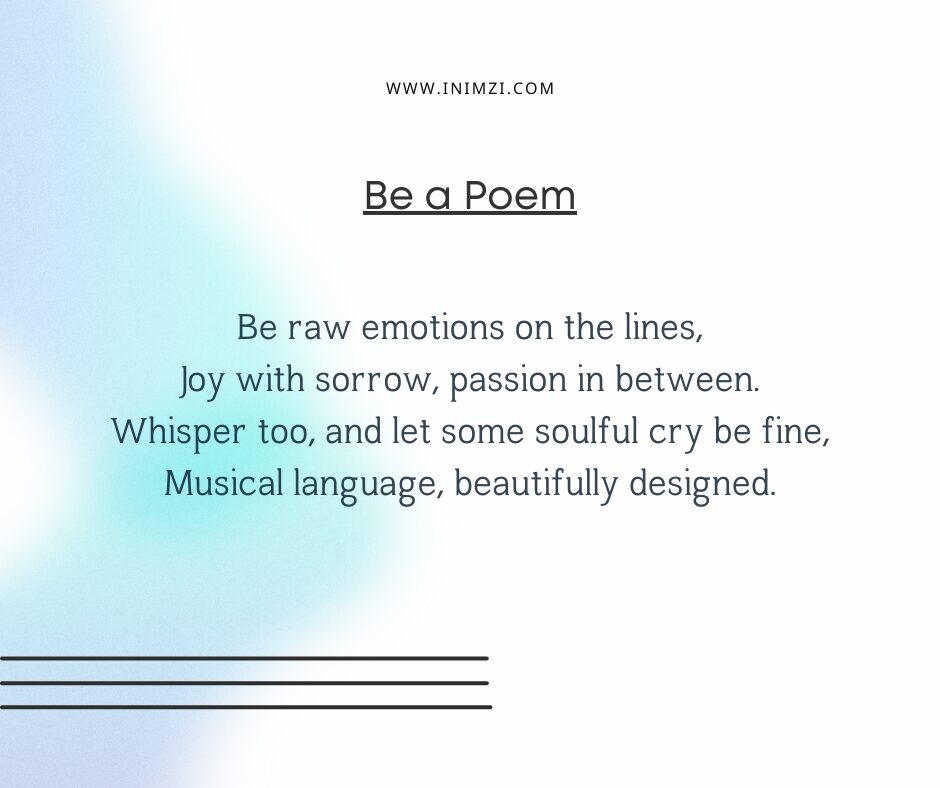Be the ink on the page that twirls and dances,
Depicting sublime concepts in words.
Be the metered pulsation, point, and rhythm’s fluctuation.
Let the muse guide ideas through poetry’s maze.
Be the metaphor that reveals the essence,
Interwoven layers of meaning.
Be the imagination that ignites an inner sense,
Transforming abstractions into images that soar aloft.
Be raw emotions on the lines,
Joy with sorrow, passion in between.
Whisper too, and let some soulful cry be fine,
Musical language, beautifully designed.
When people are most dejected, be their light,
Directing lost ships: in darkness show
The warm glow of lighthouses for those who wander at night,
A gentle morning breeze caressing softly as thoughts flow.
Let your voice be piercing yet gentle like any poet’s,
A beacon through the mundane veil.
Be always stanzas that never grow old,
Their value known regardless of time’s tale.
Be the poem
That is reborn with each new reading’s breath.
Make wonder-miracles, create verses that
Defy death in triumph and break the silence.
The Living Verse
There’s something magical about poetry. It’s not just words on a page – it’s life itself, distilled into rhythm and rhyme. This poem, it’s calling us to embody that magic, to become living, breathing verses.
Think about it – being the ink that dances on the page. It’s like what the ancient Chinese philosopher Lao Tzu said about water: “Nothing is softer or more flexible than water, yet nothing can resist it.” That’s the power of words, of poetry. They can shape worlds, move mountains, all while flowing as smoothly as a gentle stream.
When it talks about being the metaphor that reveals the essence, it reminds me of what the philosopher Aristotle said. He believed that metaphor was the mark of genius, the ability to see similarities in dissimilar things. It’s about peeling back the layers of reality to reveal the truth underneath.
Now, being raw emotions on the lines – that’s vulnerability in its purest form. The existentialist philosopher Jean-Paul Sartre talked a lot about authenticity, about being true to yourself even when it’s uncomfortable. Poetry gives us a safe space to do that, to bare our souls without fear.
The idea of being a light when people are most dejected – that’s powerful stuff. It’s like what Viktor Frankl, the psychiatrist who survived the Holocaust, believed. He said that even in the darkest times, we can find meaning and purpose. Poetry can be that beacon of hope, that lighthouse in the storm.
When the poem talks about being reborn with each new reading, it touches on something the philosopher Hans-Georg Gadamer called the “fusion of horizons.” He believed that every time we engage with a text, we bring our own experiences to it, creating new meanings. A good poem is never finished – it grows and changes with each reader.
So, how do we live this? How do we “be a poem”? Well, maybe it starts with paying attention. Notice the rhythm of your day, the metaphors hidden in everyday life. Let yourself feel deeply, and don’t be afraid to express those feelings.
Be gentle with yourself and others, like that soft morning breeze. But also, don’t shy away from speaking truth, even when it’s hard. Let your voice be that mix of piercing and gentle.
And remember, just like a poem, you’re always evolving. Each new experience, each interaction, is like a new reading, giving you the chance to find new meanings, new depths within yourself.
In the end, being a poem is about living fully, feeling deeply, and constantly creating and recreating yourself. It’s about finding the extraordinary in the ordinary, and sharing that vision with the world. So go ahead – dance, reveal, feel, illuminate, inspire. Be the living, breathing poem you were meant to be. After all, as the poet Mary Oliver asked, “Tell me, what is it you plan to do with your one wild and precious life?”
